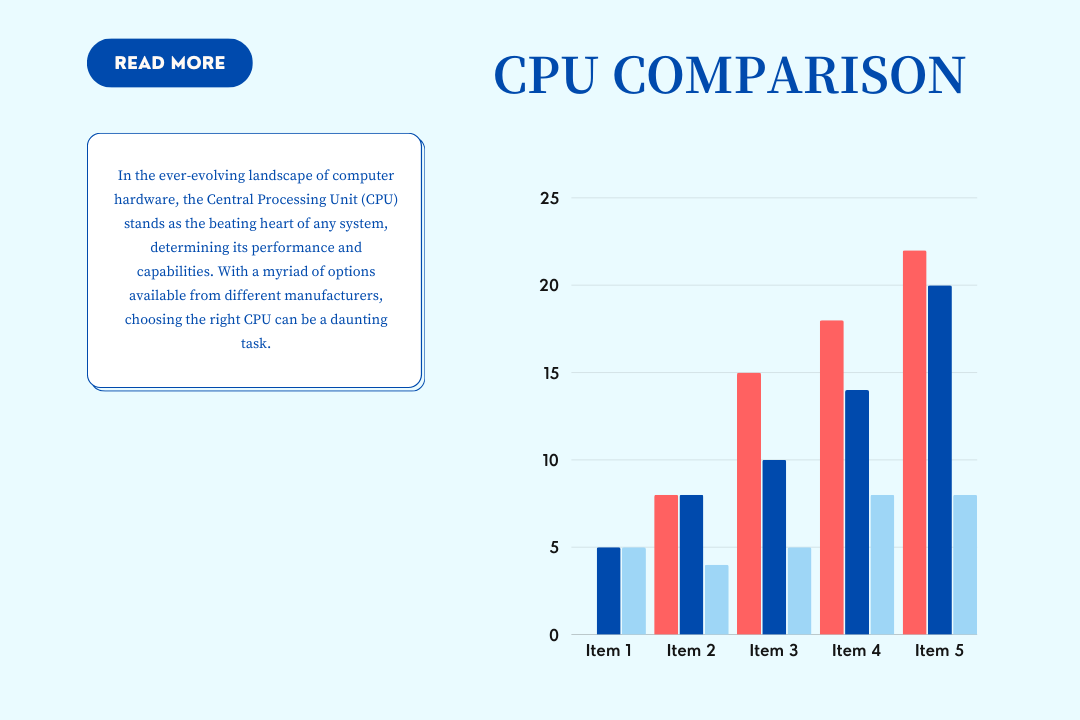
In the ever-evolving landscape of computer hardware, the Central Processing Unit (CPU) stands as the beating heart of any system, determining its performance and capabilities. With a myriad of options available from different manufacturers, choosing the right CPU can be a daunting task. Whether you’re a seasoned tech enthusiast or a casual user looking to upgrade your system, this comprehensive CPU comparison guide aims to shed light on the key factors to consider when making your decision.
Understanding CPU Basics
Before diving into the comparison, let’s briefly review what a CPU is and how it functions. The CPU, often called the brain of the computer, executes instructions, performs calculations and manages data processing tasks. It has multiple cores, each capable of executing instructions independently, and operates at a fixed clock speed, measured in gigahertz (GHz), which determines how much it Can process data quickly.
Factors to Consider
Performance: When comparing CPUs, performance is an important consideration. Benchmarks like Geekbench, Cinebench, and PassMark provide valuable insight into the raw computing power of a CPU, including single-core and multi-core performance. However, it is necessary to consider real-world usage scenarios, as performance may vary depending on the tasks at hand.
Cores and threads: Modern CPUs come with multiple cores, which allow them to handle multiple tasks simultaneously. Additionally, technologies such as hyper-threading (Intel) and simultaneous multi-threading (AMD) enable each core to execute multiple threads, further increasing multitasking capabilities. Consider your usage requirements to determine the optimal balance between core count and single-threaded performance.
Socket compatibility: CPUs are designed to fit specific motherboard sockets, such as Intel’s LGA (Land Grid Array) and AMD’s AM4. Ensure compatibility between your chosen CPU and motherboard to avoid compatibility issues.
Power consumption: Energy efficiency is becoming increasingly important, consider the power consumption of your chosen CPU, especially if you are building a system with strict power requirements or prioritizing environmental sustainability.
Integrated graphics: Some CPUs come with integrated graphics processors (iGPU), eliminating the need for a separate graphics card in everyday computing or certain applications such as light gaming. Evaluate the performance of the integrated graphics if this feature is necessary for your usage scenario.
Popular CPU Families
Intel: Known for its Core series processors, Intel offers a range of CPUs to suit different usage scenarios, ranging from budget-friendly options like the Core i3 to high-performance chips like the Core i9. Recent generations, such as the 10th and 11th generation Intel Core processors, boast advancements in performance, efficiency, and connectivity.
AMD: AMD’s Ryzen processors have received praise for delivering exceptional performance and value across the board. The Ryzen 3, Ryzen 5, Ryzen 7, and Ryzen 9 series cater to different market segments with features like multi-core performance, overclocking capabilities, and PCIe 4.0 support.
Conclusion
In conclusion, choosing the right CPU involves taking into account various factors including performance, core count, socket compatibility, power consumption and integrated graphics capabilities. By understanding these key considerations and comparing different CPU models, you can make an informed decision that suits your budget and usage needs. Whether you choose Intel Core processors or AMD Ryzen chips, rest assured that both deliver exceptional performance and innovation, leading to future advancements in computing technology.
